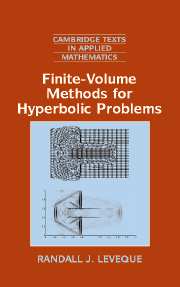Book contents
- Frontmatter
- Contents
- Preface
- 1 Introduction
- Part I Linear Equations
- 2 Conservation Laws and Differential Equations
- 3 Characteristics and Riemann Problems for Linear Hyperbolic Equations
- 4 Finite Volume Methods
- 5 Introduction to the CLAWPACK Software
- 6 High-Resolution Methods
- 7 Boundary Conditions and Ghost Cells
- 8 Convergence, Accuracy, and Stability
- 9 Variable-Coefficient Linear Equations
- 10 Other Approaches to High Resolution
- Part II Nonlinear Equations
- Part III Multidimensional Problems
- Bibliography
- Index
4 - Finite Volume Methods
Published online by Cambridge University Press: 05 September 2012
- Frontmatter
- Contents
- Preface
- 1 Introduction
- Part I Linear Equations
- 2 Conservation Laws and Differential Equations
- 3 Characteristics and Riemann Problems for Linear Hyperbolic Equations
- 4 Finite Volume Methods
- 5 Introduction to the CLAWPACK Software
- 6 High-Resolution Methods
- 7 Boundary Conditions and Ghost Cells
- 8 Convergence, Accuracy, and Stability
- 9 Variable-Coefficient Linear Equations
- 10 Other Approaches to High Resolution
- Part II Nonlinear Equations
- Part III Multidimensional Problems
- Bibliography
- Index
Summary
In this chapter we begin to study finite volume methods for the solution of conservation laws and hyperbolic systems. The fundamental concepts will be introduced, and then we will focus on first-order accurate methods for linear equations, in particular the upwind method for advection and for hyperbolic systems. This is the linear version of Godunov's method, which is the fundamental starting point for methods for nonlinear conservation laws, discussed beginning in Chapter 15. These methods are based on the solution to Riemann problems as discussed in the previous chapter for linear systems.
Finite volume methods are closely related to finite difference methods, and a finite volume method can often be interpreted directly as a finite difference approximation to the differential equation. However, finite volume methods are derived on the basis of the integral form of the conservation law, a starting point that turns out to have many advantages.
General Formulation for Conservation Laws
In one space dimension, a finite volume method is based on subdividing the spatial domain into intervals (the “finite volumes,” also called grid cells) and keeping track of an approximation to the integral of q over each of these volumes. In each time step we update these values using approximations to the flux through the endpoints of the intervals.
Information
- Type
- Chapter
- Information
- Finite Volume Methods for Hyperbolic Problems , pp. 64 - 86Publisher: Cambridge University PressPrint publication year: 2002
Accessibility standard: Unknown
Why this information is here
This section outlines the accessibility features of this content - including support for screen readers, full keyboard navigation and high-contrast display options. This may not be relevant for you.Accessibility Information
- 7
- Cited by
